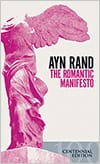Hi, Guest!

A novel is a long, fictional story about human beings and the events of their lives. The four essential attributes of a novel are: Theme — Plot — Characterization — Style.
These are attributes, not separable parts. They can be isolated conceptually for purposes of study, but one must always remember that they are interrelated and that a novel is their sum. (If it is a good novel, it is an indivisible sum.) . . . .
A novel is the major literary form — in respect to its scope, its inexhaustible potentiality, its almost unlimited freedom (including the freedom from physical limitations of the kind that restrict a stage play) and, most importantly, in respect to the fact that a novel is a purely literary form of art which does not require the intermediary of the performing arts to achieve its ultimate effect.

A good novel is an indivisible sum: every scene, sequence and passage of a good novel has to involve, contribute to and advance all three of its major attributes: theme, plot, characterization.

Since the theme of a novel is an idea about or pertaining to human existence, it is in terms of its effects on or expression in human actions that that idea has to be presented.
This leads to the crucial attribute of a novel — the plot . . . .
To present a story in terms of action means: to present it in terms of events. A story in which nothing happens is not a story. A story whose events are haphazard and accidental is either an inept conglomeration or, at best, a chronicle, a memoir, a reportorial recording, not a novel.